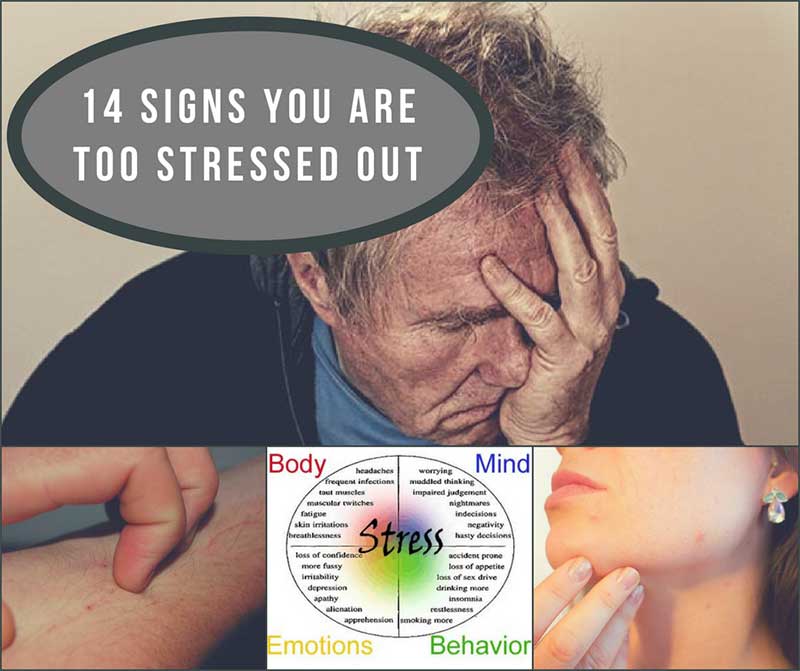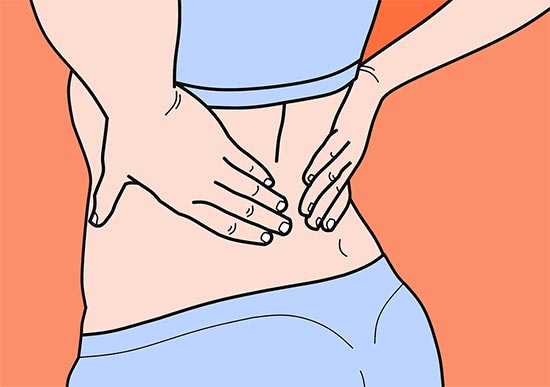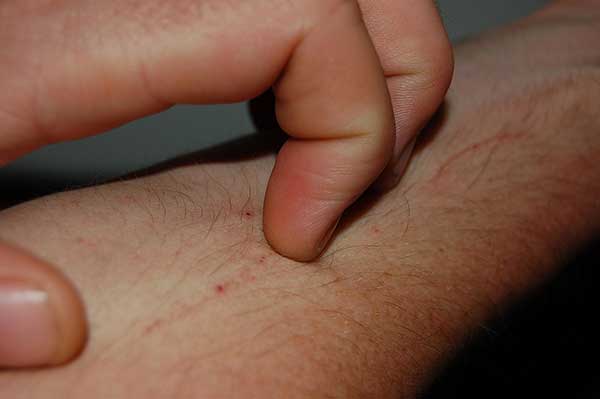14 Signs You are Too Stressed Out
Stress is a normal part of life, but stress also causes a variety of reactions. Occasional stress, such as an impending deadline, is normal and typically doesn’t lead to symptoms or ailments. Frequent stress can cause physical ailments. You might not realize the signs your body is related to stress.
The stress signs can affect your health, and you will have no idea it’s because of the massive stress you are under. Here are signs that your body is under too much stress.
14 Signs You Are Too Stressed Out
Body Pain
Too much stress in your system causes your body to break down. You might experience stomach pain, diarrhea, ulcers, chest pain, chest palpitations and muscle pain. Some people note that they experience more back pain when cortisol levels are higher.
Sleeping Issues
Problems sleeping can be a sign of many problems, but stress can greatly affect your sleep. You might try several home remedies to get a good night’s rest when you find yourself tossing and turning all night long.
If your sleeping problems persist, you don’t want to ignore the signs that something is wrong. Stress causes hyperarousal, which changes the balance between sleep and wakefulness.
Increased Headaches
You might notice more headaches, especially when you are in a less stressful situation. That seems strange, but your body almost gets accustomed to the levels of cortisol in your system. When those stress levels decrease, such as the weekend when you aren’t at work, you might notice more migraines and headaches.
Weight Fluctuations
If your appetite changes often, it could be due to stress. Those who have a lot of stress notice they have ties when they are overeating or eating drastically less than normal. The appetite changes are due to the stress that slows down your metabolism. Stress causes oxygen cells in your body to receive less oxygen, which is important for a healthy diet and to avoid weight fluctuations.
Bad Menstrual Cramps
Women who are under a lot of stress are more likely to have painful menstrual cramps compared to women who aren’t under as much stress. The worsened cramps are due to an imbalance of hormones due to the stress.
To combat these terrible craps, try to exercise. It might be the last thing you want to do, but it can soothe cramps and reduce stress by decreasing sympathetic nervous system activity.
Acne
When you are stressed out, you tend to touch your face frequently, spreading bacteria. It leads to more acne. During periods of stress, researchers show an increase in the severity of acne.
Use a lotion containing salicylic acid or benzoyl peroxide to beat back your increased acne. Make sure you also include a skin moisturizer in your daily routine as well because these products can dry your skin. If you don’t see improvements, your doctor can prescribe a stronger medication.
Itchy Skin
You have acne and itchy skin, and you are probably miserable! Many people find that they experience itchy skin when their stress levels are higher. The chronic itch is called pruritis, and it is twice as likely in those who are stressed than those who are relaxed.
Stress aggravates underlying conditions that you may or may not know you have, such as psoriasis and dermatitis eczema. The stress response in our body activates nerve fibers leading to the itchy sensation on your skin.
Worse Allergies
Doctors believe that stress can make allergy sufferers have more symptoms. Stress stimulates the production of IgE, a blood protein that leads to allergic reactions. If your allergies are intense, it might be stress, not the pollen in the air.
Achy Mouth
You may not realize it, but an achy mouth is a sign that you are under too much stress. Stress causes people to grind their teeth or tightly hold their mouths shut when they are sleeping. So, when you wake up, your jaw feels like someone punched you.
Unless your partner elbowed you in the middle of the night, stress is to blame. As your dentist about a nighttime mouth guard. It can greatly reduce or stop your teeth grinding. Once you kick the stress, the grinding should subside.
Strange Dreams
Are you having strange and vivid dreams that leave you shaking when you wake? For someone who isn’t under stress, dreams typically increase in positivity throughout the night, so you wake up in a good mood.
Those who live under stress get strange, unpleasant dreams at night instead. You also might wake up more because of these unpleasant dreams. Try your best to get 7 to 8 hours of sleep each night. Avoid caffeine and alcohol before bed as well.
Sweet Tooth
Not only are you having strange dreams, but now you have a serious sweet tooth. Women might wonder if they’re pregnant! Stress causes pre- and postmenopausal women to crave chocolate. Other factors, such as hormones, may be at play here as well. Eating chocolate isn’t so bad, right?
Decreased Sex Drive
Stress causes people to experience a decreased libido. It is easy to understand. When you are stressed, sexual intercourse might be the last thing on your mind. Men and women both experience decreased libidos when their cortisol levels are higher than normal.
Fast Heart Rate
If you are too stressed out, an increased heart rate is a common sign. The heart rate activity increases or decreases in response to the stressful and non-stressful events. Those who are in stressful situations experience faster heart rates. If your stress continues throughout the day, your heart rate might be increased all day, tiring you out.
Bleeding Gums
People with higher cortisol levels have a higher risk of periodontal disease. Chronically increased levels of the stress hormone cortisol impairs the immune system, which allows the bacteria to invade the gums.
Make sure you brush your teeth after each time that you eat. Exercise and sleep often, both of which are proven to reduce stress levels in your body.
 Home and Gardening Ideas At home and Gardening ideas we believe inspiring readers about homesteading, self sufficiency
Home and Gardening Ideas At home and Gardening ideas we believe inspiring readers about homesteading, self sufficiency












